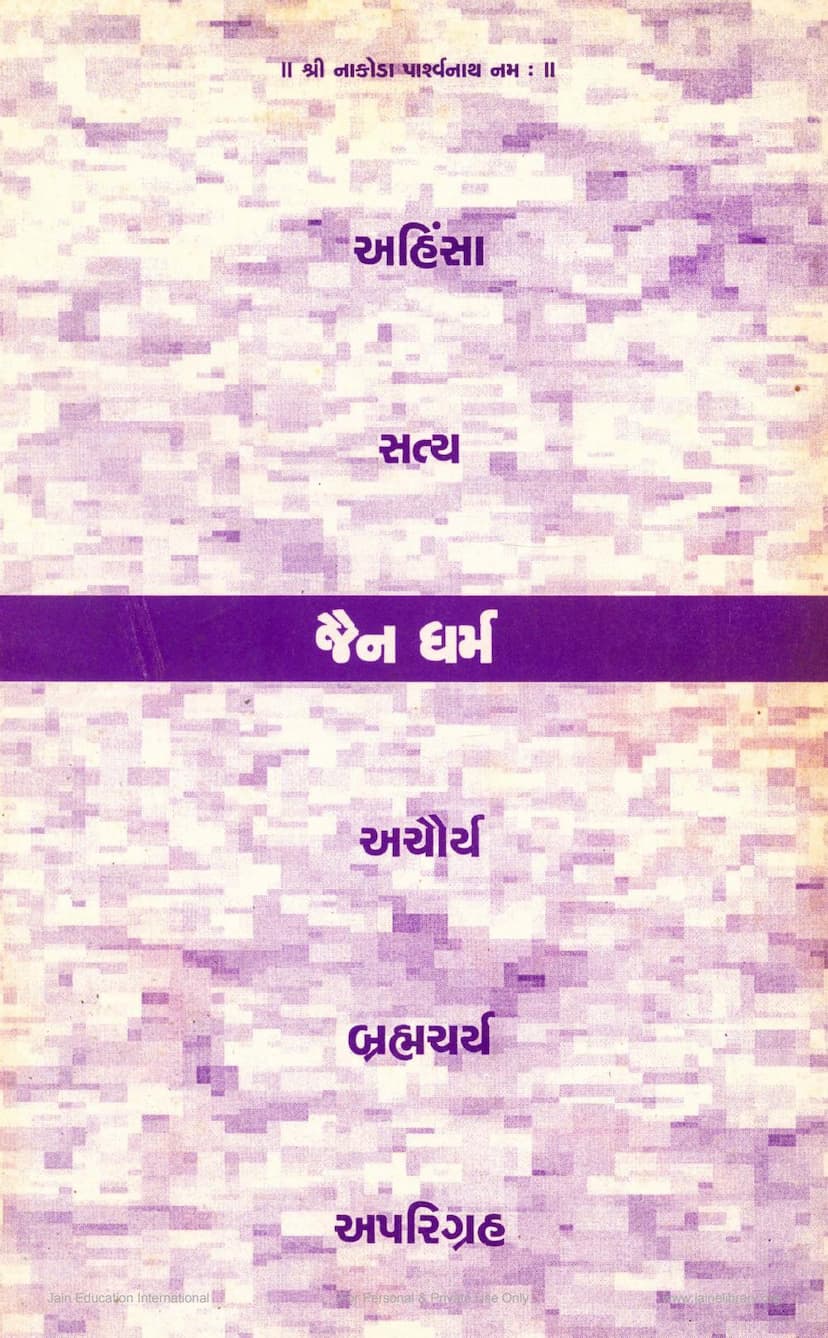Jain Dharm
Added to library: September 1, 2025

Summary
This document, titled "Jain Dharm" and published by the Marghaben Chimanlal Vakil Charitable Trust, serves as an introductory guide to Jainism. It aims to provide a clear and accessible understanding of its core principles and practices, particularly for the younger generation who may perceive the religion as solely based on prohibitions.
The book begins with a glossary of fundamental Jain tenets: Ahimsa (non-violence), Satya (truth), Asteya (non-stealing), Brahmacharya (chastity/celibacy), and Aparigraha (non-possession). It also includes the Navkar Mahamantra, a central prayer in Jainism.
The introductory sections (Pages 5-6) feature endorsements from religious and academic figures, highlighting the importance of understanding Jain principles for societal upliftment and praising the author's efforts to disseminate this knowledge.
The main body of the text systematically explains:
- What is Religion? (Dharm): It defines religion as the path to removing impurities and weaknesses, fostering cleanliness and purity, and understanding one's duties and responsibilities. It emphasizes that true religion leads to the cessation of suffering and the attainment of eternal happiness.
- What is Jain Dharma?: Jain Dharma is presented as an ancient Indian religion that guides individuals towards becoming masters of their souls by freeing themselves from all karma. This path is associated with the "Jinas" (conquerors) who have achieved victory over their senses, mind, and passions. The text clarifies that the 24 Tirthankaras, including Rishabhdev, Parshvanath, and Mahavir, are not divine avatars but humans who attained enlightenment through rigorous practice and spiritual discipline.
- Core Principles of Jain Dharma:
- The Soul (Atma): The soul is described as eternal, uncreated, and inherently conscious. It is formless, intangible, and capable of inhabiting any body, from an ant to an elephant. The soul is immortal, though the body it inhabits is perishable.
- Karma: The universe operates on the principle of karma. Actions (karma) have consequences, and the soul experiences the fruits of its deeds, leading to rebirths.
- The Five Great Vows (Panch Mahavratas): These are the foundational ethical principles of Jainism:
- Ahimsa (Non-violence): This is the paramount principle, encompassing non-violence in thought, word, and deed towards all living beings, including microscopic ones. It also includes cultivating compassion and empathy.
- Satya (Truth): Adherence to truth in all aspects of life, emphasizing honesty and the avoidance of deceit.
- Asteya (Non-stealing): Not taking anything that does not belong to oneself without permission.
- Brahmacharya (Chastity/Celibacy): This refers to control over sensual impulses and passions. While complete celibacy is the ideal for ascetics, maintaining fidelity in marriage is considered a form of Brahmacharya for householders.
- Aparigraha (Non-possession): Limiting one's possessions and desires, recognizing the impermanence of material wealth and attachments.
- The Six Kaashayas (Passions): The text delves into the negative passions that bind the soul: Kama (lust), Krodha (anger), Mana (ego/pride), Maya (deceit/illusion), Lobha (greed), and Moha (attachment/delusion). It explains how these passions lead to karma and suffering, and the importance of conquering them for spiritual progress.
- The Four Bhavanas (Attitudes): These are essential for spiritual growth: Maitri (friendship towards all beings), Pramod (joy in the virtues of others), Karuna (compassion for the suffering), and Madhyastha (equanimity towards wrongdoers).
- The Concept of Liberation (Moksha): Moksha is the ultimate goal of Jainism, representing the liberation of the soul from the cycle of birth and death through the complete annihilation of karma.
- The Jain World System: The text briefly describes the Jain cosmology, dividing the universe into three parts: Urdhva Loka (upper world of gods), Madhya Loka (middle world of humans and animals), and Adho Loka (lower world of hellish beings).
- Types of Karma: The book details the eight types of karma (Jnanavaraniya, Darshanavaraniya, Vedaniya, Mohaniya, Ayushya, Nama, Gotra, and Antaraya) and the actions that lead to their accumulation.
- Asceticism and Lay Practice: The text distinguishes between the path of ascetics (Sadhus and Sadhvis) who observe the five Great Vows in their entirety, and the path of lay followers (Shravaks and Shravikas) who observe twelve vows (five Anuvratas, three Gunavratas, and four Shikshavratas) in a modified, householder context.
- The Six Essential Daily Practices (Chhah Aavashyak): These are fundamental practices for spiritual purification and progress:
- Samayika: A period of equanimity and meditation, aiming to achieve a state of inner peace and detachment.
- Chaturvinshti Stavan: Praising the virtues of the 24 Tirthankaras.
- Vandan: Showing reverence and respect to ascetics and enlightened beings.
- Pratikraman: A ritual of repentance and self-reflection for any transgressions of Jain principles.
- Kayotsarga: A practice of non-attachment to the body and mind, focusing on the true nature of the soul.
- Pratyakhyan: Making vows and commitments to abstain from certain actions or desires, thereby cultivating self-control.
- Sadharmi Bhakti Abhiyan (Fellowship Service Campaign): The latter part of the book describes a charitable initiative by the trust to support needy Jain families by providing them with essential provisions and offering vocational guidance. It encourages participation in this noble cause.
In essence, "Jain Dharm" is a comprehensive overview of Jain philosophy, ethics, and practices, emphasizing the path to spiritual liberation through self-discipline, ethical conduct, and the pursuit of knowledge and equanimity. It aims to inspire readers to embrace these principles for a more meaningful and peaceful life.